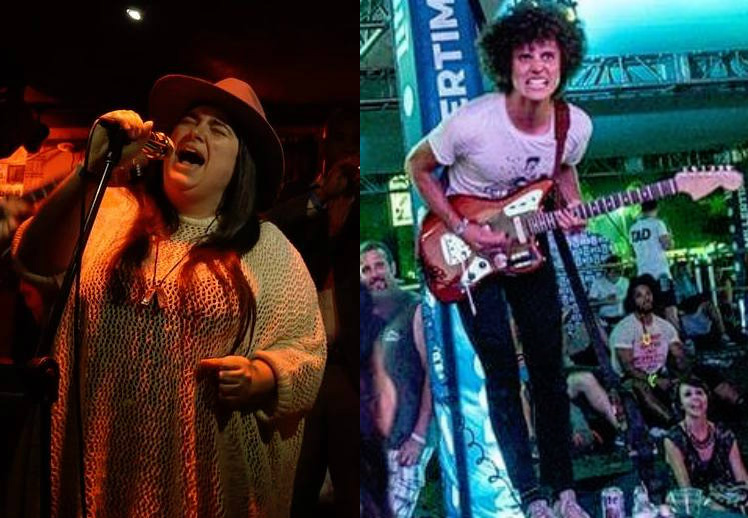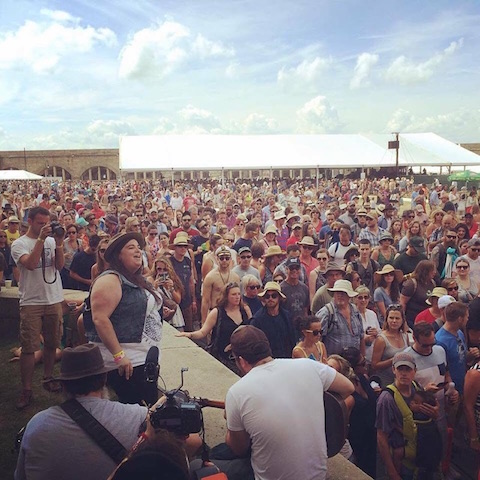
Julie Rhodes photo by Joanne Silva, Ron Gallo photo courtesy of Paste Magazine
Just as the spirit of rebellion lived on in America’s consciousness long after the fight for freedom was over, there are a pair of powerful, rebellious voices slated to play Once Somerville this Wednesday to help you keep the spirit alive a few days after the fourth. So if you haven’t quite got your fill the diverse co-bill shared by local Somerville soul singer Julie Rhodes and Nashville by way of Philly garage rocker Ron Gallo is a show you should support. The show also opens with Brooklyn’s Leland Sundries whose frontman Nick Loss-Eaton is a Lexington, MA native and whose latest album Music for Outcasts couldn’t be more appropriately fitting on the bill.
When striped away of the very different musical approaches, both Rhodes and Gallo use the stage as a soapbox to exercise their first amendment rights to fullest extent. The pairing of Rhodes’ bluesy soul roots music and Gallos fuzzy garage rock have toured together before and have both been building reputations alongside each other as artists and friends whose music delivers a message of empowerment and call to higher consciousness. To deliver the message each has their own unique voice that fills every corner of the room with raw emotion and conviction.
Gallo who formally fronted rockabilly band Toy Soldiers has reincarnated himself as the leader of a crunchy garage rock power trio. His latest release is a three song EP titled RG3 that packs a punch and calls people to wake up from their drone-like existence of consumerism and technological addictions.
Rhodes, a local self branded soul-woman released her debut record Bound to Meet the Devil last year and has been on winning over audiences ever since. Her message perhaps more populist than Gallo’s harbors on the plight of the working-class and champions empowerment as well as enlightenment. We got the chance to catch up with her to talk about how she started singing, recording her debut album in Muscle Shoals, Alabama and her famous guerrilla set at last years Newport Folk Festival.
Allston Pudding: Bound to Meet the Devil is your first record, when did you start singing and writing songs?
Julie Rhodes: I feel like I’ve always been singing but its never been front of an audience, it was always just a hobby. I mostly sang to myself in the car or at home. I always wanted to sing in front of an audience but I was always really shy until about two years ago when I met Jonah (Tolchin) and my guitar player Danny Roaman who really kind of pushed me to actually do it and get myself out there. I wrote my first song only about six months before we started recording Bound to Meet the Devil, so that was about two and a half years ago.
I did a lot of traveling for shows when I was younger like as a teenager basically after I got my license all the way up until now, following tours and seeing bands in other states. It was really on the drives that I would do a lot of singing by myself. i was always shy and really scared to sing in front of other people even my friends. I always liked to sing but nobody really knew that, but it wasn’t until recently that I felt like I could cross over and start doing it and started writing.
AP: You got to record some of the record down in Muscle Shoals Sound Studio in Alabama, the home of Fame, did that setting influence the record?
I think that the record influenced the decision to go to Muscle Shoals verses the other way around. We had most the record done already before we went there, but the songs that we recorded really kind of called for a Muscle Shoals feel. So we wanted to get some horns and some keys and singers on there and what we had already recorded felt like it needed it. The songs were really what determined our decisions to go there.
The reason why we chose Muscle Shoals because it was sort of because that documentary that came out. I always think its kind of funny how documentaries can bring stuff to light that you didn’t know about before. Especially a studio like Muscle Shoals, at least for us in New England I feel like muscle shoals is not really a household name as much as some other studios were. It wasn’t until recently, until after the documentary really came out that it came into light. After seeing it is when Jonah and I were like I bet we could do something there and thats how we decided to do it.
We reached out to the main engineer there, sent him some songs and he was into it and he reached to some of the background singers there and everybody was just on board. It was actually quite easy to get in there. It was cool.
AP: Who are some of your influences that drew you into writing and singing blues and soul music?
I think that my influences don’t necessary come from that area. Which I think is true for most people. A lot of people from my generation, not everyone comes out of or grows up listening to roots music or soul or folk or americana or whatever. Its just something at the time it was the pop music of that day, but when I was young I was listening to 90’s pop music, specifically some things that inspired me in a soul aspect of nineties music people like Lauryn Hill. Which I would consider to be an influence at a young age not knowing I had influences. I was really into punk music and pop punk music I think I pull a lot from that sort of thing. this band called RX Bandits out of California they were one of my favorite bands and still are to this day. I think thats a lot of the working man political aspects of my songs come from.
Today, everybody’s tastes really evolve over time and you you start to really dig into some of the older artists as you get older and learn more about music. Artists like Etta James and Bill Withers and people like that… I consider to be some of my current influences but it didn’t start off that way.
AP: You play a lot of shows with Ron Gallo, how did you guys meet and become friends?
There is this local house show series here in the Somerville area called Kitchen Sessions. Its a small world, Jonah was playing the Kitchen Sessions and at the time I was a fan of Jonah’s. We weren’t working together musically I was just a fan of his music. So I went out to see him and opening for Jonah at this house concert series were Toy Soldiers. I had never heard of them or seen them or anything but they started playing and I was like ‘what the fuck am I hearing, this is crazy’ and I just became a really huge fan of Toy Soldiers. That was Ron’s old band and I would just go see them all the time, anytime they were in town I would come out to see them.
Once I started making music Ron and some of those guys already knew me and were friends at that point so it just seemed kind of naturally to kind of start doing shows together.
AP: On the surface it would seem your music is very different, what commonalities do you think Ron and yours music have?
I think that Ron and I have similar views almost in a political way.
Both of us would like to have some sort of voice about the current state of the world and in particular our country. He and I both have different ways in going about it and we bring up different issues through the music. My music in particular mostly themes on the working-man and how hard it is to get by as a working person in this country and a lot of his material comes from the sort of haze that we have over our eyes as Americans, just this sort of like failure to exist in the present world without being bombarded with social media and needing to be cool and all of that stuff.
AP: You guys essentially toured together this past spring that included some shows at SXSW, what is your fondest memory of that tour?
That whole tour was fond memories. The entire tour was so much fun. We really didn’t have a single bad show and every single show we played it was like touring with brothers, like family. There are still inside jokes from it about the tour that we joke about today.
AP: Last year you performed a sort of guerrilla set at Newport folk fest which is a tradition that dates back to the festivals of the 60’s. Was that something you were aware of or did you just feel compelled to perform there and decided to make it happen?
To be honest I was like 95% positive that we were going to get kicked out for that. I did not know that was something that was tradition. The Newport culture you would assume that that sort of thing would be celebrated but at the same time you don’t know. So we did it kind of taking a risk, but I still think to this day that if it wasn’t for Newport Folk Festival I wouldn’t be making music right now. Its where I met Jonah, my guitar player for the first time, its where I really started developing a love for roots music and soul music. It opened my eyes up to the true community of those styles of music versus what I was raised on which was a lot different. It sparked a transition in my way of thinking in regards to music. So yeah, I just really wanted to play and my guitar player just happened to bring his little resonator guitar and I was like Ya know what if we cant lay a stage then lets just do it. Then somebody came over with a camera and started filming it and they were like ya know surprisingly your like one of the only people we’ve seen do this, and thats crazy because thats the spirit of Newport and what this festival is all about. So I was really happy that we decided to just do it.

AP: Are their plans for a follow up to Bound to Meet the Devil?
Yeah, so we have Wildwood Revival festival in Athen’s Georgia so we’re going to do a tour on our way down there so we’re probably going to hit up Nashville and do another date with Ron and that should be fun and the plan is really to just play out as much as possible and for as many new people as we can. Hopefully sooner rather than later start working on tunes for a new record.
Julie Rhodes and Ron Gallo play Once Somerville this Wednesday with Leland Sundries. Tickets are $8 advance and $10 at the door.
